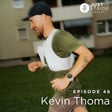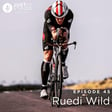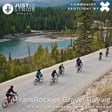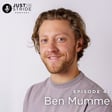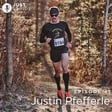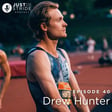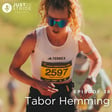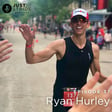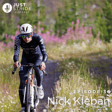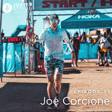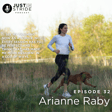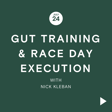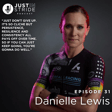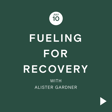Introduction to Podcast
00:00:06
Speaker
Hello and welcome to the Justin's Drive Podcast. I'm your host, Justin Puleze. If you love endurance sports, you've definitely come to the right place. On this show, we'll talk to athletes, coaches, and professionals who can help us reach our true potential. Being a student of distance running for over 10 years and interviewing people in the sport for the last five, I've learned a ton, but there's always more to discover.
Podcast Sponsorship and Social Media
00:00:29
Speaker
Everyone has a story, and I know you'll resonate with each of our guests as we embark on this new journey together. Join us at home, on the road, or while you run. Together we'll have some fun. So follow along on Instagram at justinstridepod and your favorite podcast platform and prepare to be inspired. Come along for the ride with Justin Stride.
00:00:53
Speaker
This episode is presented by our friends at Exact Nutrition, a tasty and healthy way for you to fuel your body before, during, and after a solid training session. I can't leave the house without a few fruit bars in my pocket and they never make it back home. Exact is offering you 50% off your order when you use the code justinstride. So head to exactnutrition.com and fuel your goals today.
Impact of Social Media on Mental Space
00:01:16
Speaker
I often say that social media is a two edge sword.
00:01:19
Speaker
On one hand, it can consume our time and we can easily compare ourselves to others, putting us in a negative mental space. On the other, we can document our journey and share with anyone out there willing to listen, potentially impacting someone in a more positive way. I much prefer the latter if I do say so myself.
Rob Perez's Transition to Ultra-running
00:01:36
Speaker
On today's episode of Justin Stride, I had a chance to connect with ultra runner and content creator Rob Perez.
00:01:44
Speaker
Rob got into running as a way to prepare for the intense training he experienced during his time with the US Navy. He built his base running five miles daily, quickly jumping into ultra-running events covering 50 kilometers and beyond. After years of consistency, Rob took on the challenge and completed the Speed Project solo earlier this year, and plans on completing the International Edition by crossing the Atacama Desert this November.
00:02:09
Speaker
Above all else, Rob loves creating useful running content on his social platforms, covering registration hacks, training tips, fueling advice, and so much more.
Running Events and Travel Schedule
00:02:20
Speaker
All in an attempt to help fellow runners as he hopes to make running more available and accessible to all. Rob, welcome to the Justin Stride podcast. How's it going? Yeah.
00:02:33
Speaker
I appreciate you taking the time, taking the invite, and I know it's like super short notice, but we got it turned around here. No, you're all good. This is better. I operate on the fly, so we're good to go. Yeah. So how are you doing recently? I know, well, you put out tons of content. I think that's how you kind of ran across my Instagram feed and how I started following you, but I'm loving everything you're putting out there. I know you just raised the Copenhagen half, and it seems like you never stopped running.
00:03:02
Speaker
Yeah, it's been a busy, busy, busy last two months. This is my first weekend where I will be sleeping in my own bed on a Friday and Saturday night. The last eight weekends have all, I've been gone traveling all, I would say 90% running related, which has been a blast. I would love to keep doing that.
00:03:23
Speaker
need one more rest weekend because the following weekend is a Marine Corps marathon, which is kind of my last chance at throwing down a fast time. So I figured I'd get some rest this weekend.
00:03:33
Speaker
And have you done that one before? I've cheered it almost every year. I've lived in DC for five years. Um, so it's obviously the big race in DC. So I am beyond excited to finally be running in the city that I live in, which is actually something I thought about it. I've never actually
Challenges in Content Creation During Races
00:03:49
Speaker
done. Um, so this will be the first time that I have kind of the home to home field advantage. And I have some, uh, some fans out there and some people that are even cheering me on, which is super cool.
00:03:58
Speaker
So you know the course super well, like why is, why that really looked at it the other day. I do know the course, um, pretty well. When I run races like that, I black out anyways, so I don't remember and know exactly what's going on. Um, but yes, I do have a good idea at the course. I also know where a couple of the different bigger running clubs out here in DC are going to be at for cheering. So I'll know where I'm going to get my like little energy boosts. So I'm planning for that accordingly.
00:04:24
Speaker
Any content on like pre-race stuff?
Training Approach for 50 Marathons in a Year
00:04:29
Speaker
Yeah, I believe it or not. I struggle to do content during fast races. That's why I like ultra marathons and stuff because I can
00:04:37
Speaker
take my time, I can walk, I can eat, I can kind of talk to my phone and eventually create something from it. When I'm running like a 645, 650 pace, it's really hard to even pull my phone out of my pocket safely and securely record something, say some words, and then get back to running and get the phone back in my pocket. I do focus more on the racing. So we'll see how much I get. Like I said, I'll have a bunch of support out there and people that are also just watching. So I'm hoping they get some clips that I can kind of throw together and throw a little recap together after.
00:05:06
Speaker
Yeah. But as I understand it, like you're an ultra run, right? So a marathon, obviously like different pace, but is this, this is kind of training for always something else? Like is a marathon half kind of like a, always like a training kind of thing.
The Speed Project and New Friendships
00:05:21
Speaker
Yeah, I treat a lot of the marathons as training runs. As you may have seen, my big thing this year is I want to get 50 marathons run in a year, which at that rate is about a marathon a week. So I'm on pace for that. Because of that, though, I can't treat every single marathon like it's a race and go out for a sub three goal every time. Post-marathon, I'll probably be pretty torn up for about two to three days and just be doing some very, very, very light running.
00:05:49
Speaker
And so if I treated every marathon like that, that would eliminate half of my year just to be down for three days every week. So yeah, crazy. So what is like, uh, even your mileage look like, uh, it, it, it varies. It should be more consistent. I'm not the best person to, uh, I'm uncoached. I'm untrained. I am. I'm just a person that goes out and runs based on how I feel.
00:06:11
Speaker
Um, which has helped keep me injury free. However, that also leads to some weeks where I may only get 15, 20 miles when I'm used to running 70 plus miles a week. So I'm ramping back up, uh, as I get ready for these last final races this season. And then, uh, next year started back up in February, March timeframe. We'll get back to running full time and get ready for that season too.
00:06:33
Speaker
Crazy. And I think, I mean, part of like why I started following you two is obviously like Speed Project. These are ultra endurance kind of races. Like, you know, what drew you to that? And like, I mean, it was a great start to the year, I guess, for you.
00:06:50
Speaker
Yeah, I run with a predominantly Northeast track club. I run, I kind of at this point run with everyone, but Northeast track club out of DC is, is kind of my home. I've been with them for a little over three years. Um, they had a relay team go the past couple of years and I watched, um, I never put my name in for the relay. I was just more interested in kind of seeing it. Um, and then I later found out there was a solo option and.
00:07:15
Speaker
uh, one of my, uh, one of the people that runs Northeast track club kind of approached me and said, Hey, we have a connection. We can put your name in. Would you want to put your name in, you know, put your name in the hat and apply? And I said, sure. You know, I don't know. I don't think I'm on that level. And this is mind you at the time I'm watching names like, um, uh, Jess Woods from Nike up in New York. I'm seeing names like that. Um, while I'm blanking on his name, uh, the, uh, now the new Red Bull athlete, um,
00:07:44
Speaker
that runs with on Kilgore. Oh yeah. Yeah. Kilgore is out there running. I'm just seeing names like that on there. And then here I am getting asked if I want to, you know, jump to that level. Um, so it was intimidating definitely. But at the same time, I knew if I brought a good crew with me and everything, we would have a good time and we would make it happen. So that's exactly what I did. And I was like, you know what? Let's put our name in there. Let's get a crew
Rob's Background and Navy Experience
00:08:07
Speaker
together. Let's, you know, train for it. And a couple of weeks later, I got the acceptance email and
00:08:13
Speaker
That was kind of all she wrote at that point. I was ready to start running. Amazing. So how was that the biggest thing you've ever taken on like run wise? That is definitely the biggest. Um, that was, uh, the route we took was a hair under 300 miles. It was like 298 or something like that. Um,
00:08:32
Speaker
105 hours to complete it. It was, that's the most running I've done in a short span of time. I was doing first three days. I did about 65 miles a day, right around a hundred K and then day two and day three cut back just a little bit as I finished and went through kind of some of the harder terrain. So.
00:08:49
Speaker
Quite the time. Quite the time. Yeah, right. And I mean, our first guest, as I mentioned to you before, we spoke here, Lucy Sholes, like won the thing and. Oh, she's amazing. She is my inspiration. Were you guys friends before the speed project or? No, actually, we just had, we both had the exact same gut feeling we got on the first speed project call.
00:09:11
Speaker
Which again, I, I, I jump on this call. I have no idea who to expect on the other end. It's the race director Nils and a couple other runners who, um, one of them, for example, is James pool who did speed project completely by himself. He had no crew. He ran with the backpack. Um, I think three pairs of socks and three underwear. And he said, that's all he would change and rotate through.
00:09:33
Speaker
Yeah, so I'm like seeing names like that pop up on the screen. And I don't know where Lucy pops in. And she's like, Hey, guys, sorry, just finished Rocky Raccoon 100 miler. But I'm here for the call. And I'm like, these people are
00:09:46
Speaker
jumping on a call post 100 miler.
Challenges of Running on a Submarine
00:09:49
Speaker
I'm at the bar. The second I finish a race, I'm at the bar. These people are jumping on a call in preparation for their next race. So I'm just, you know, it's already changing my perspective, but I was like, I like her. She's good energy. Then we get to LA and we were in this big group text multiple times. Lucy and I had a couple of calls on the side, um, just about like route. And we were kind of sharing cause we were, if anything more, the amateurs compared to, like I said, some of the bigger names that have run it before. Um,
00:10:15
Speaker
So we get out there and Bandit running has a pop-up. And I was like, Lucy, I'm going to the pop-up. I love the guys at Bandit. You should definitely come check it out and come hang. And at the pop-up, we hit it off immediately. We just had the best time. Her friend,
Overcoming Injuries and Learning Experiences
00:10:30
Speaker
Lindsay, who was kind of like her team captain, was out there. A couple of my teammates were already out there, and we were just coking and joking for hours at this pop-up, eating pizza and hanging out.
00:10:40
Speaker
From that point on, we truly have been best friends. I surprised her in New Orleans a couple, wow, that was what, a month and a half, two months ago now? Yeah, we are, you cannot separate us. It's kind of, it's scary. Yeah, well, you documented that too. So I thought that was really, really fun and cool that you did that. And, you know, obviously get a couple of miles in, right? Absolutely. We went and ran. That was immediately what we did. You can't, you can't avoid it when all, when you know each other through running, you're going to go run together.
00:11:10
Speaker
Yeah. Would you say that's one of maybe your best connections you've made through running? Oh, absolutely. I tell everybody. I mean, Lucy came and visited DC, and again, with my running club, Northeast Track Club, we have a Discord channel with a couple hundred people in it. I threw her name in there and just said, hey, Lucy's coming by.
00:11:30
Speaker
If anyone wants to grab a drink, like we'll be after the workout, we'll be grabbing a drink and the response was crazy. Everyone was like so excited to just meet, you know, you've probably told Lucy story, but she broke the men and women's record for LA to Vegas. Like she is iconic
Advice for New Runners
00:11:46
Speaker
and she came in and that was her first ever kind of experience doing something like that. So she just absolutely crushed it. Um, and yes, she is someone I look up to and someone that I get.
00:11:55
Speaker
a lot of energy from being around and from just interacting with, even if it's just a phone call for five minutes. And it's, she's so like humble about it, you know, maybe not something. Yeah. You would have no idea. She would never bring it up. She will never bring it up. I'm always the one to bring it up in conversation.
00:12:12
Speaker
Right. Yeah. And yeah, that's admirable for sure. And like so impressive. Like, I mean, I had her on the, she was the first episode on this new, new show and I was like thrilled to have her and excited to hear her story. And yeah, I just couldn't believe it, you know, definitely, definitely one of the top friends from it. For sure. Um, like maybe a little background on you, Rob, like, you know, how was it for you like growing up and like, I know you, you're a guy from Chicago and
00:12:40
Speaker
Like were you an active kid? Like when, you know, when did running into your life, it seems like it's a huge part of your life right now. Like what was, has it always been? I, uh, let's see. Yeah. I grew up born and raised in the Northwest suburbs of Chicago, a town called Displains. Uh, it's probably about 30 minutes outside of the city. Um, I was an active kid football and volleyball were, uh, the sports I played in high school. I also actually raced the go-karts at one point in my life. Like,
00:13:07
Speaker
Arguably semi-professional. Um, some of the guys I raced against are now in the Indy 500. So yeah. So I did that. It was, yeah. Did a lot of things. I tried it all and obviously did the whole like soccer. I had the tee ball,
Balancing Content Creation and Training
00:13:20
Speaker
you know, did, did all that, but, um, volleyball turned out to be the one that I stuck with the longest plate club, loved it, played it for nine years, I believe straight, um, competitively. And then, uh, it was time to go off to college.
00:13:35
Speaker
I ended up dropping out of college and realized I wanted to join the military. So I enlisted in the Navy and that's when the running kind of kicked in. I wanted to go do something in special forces. Didn't really know what, but I knew that those guys were really fit. And so I was like, let's go run. So I ran five miles a day or so somewhere around there.
00:13:57
Speaker
signed a contract to be a submariner and actually work on boats underwater, boats that are designed to sink on purpose, which is wild. My recruiter was a submariner, so he was pushing for it.
00:14:10
Speaker
signed up for that, ended up finding out because I signed that contract that I wasn't able to even try out for special forces, but I kept up with the running. That was in 2013, I joined the Navy. 2016, I went and did my first ultra, and it was actually my first big race. I had never done a half marathon or a marathon at that point. I jumped right into a trail, 50K, and I knew I loved it immediately. I was sore for days on end after that, and it was out in the woods, but immediately fell in love with the sport.
00:14:40
Speaker
the ultra side of it. I love marathons, big city marathons are fun, but I was drawn to, I mean, this ultra, the very first aid station you get is after 2000 feet of climbing, you get bacon, beer, and bourbon. That's all they had to serve. Um, and I was like, I'm hooked. This is cool. It's way cooler than eating gurus and drinking water and being, um, yeah. So then from there,
00:15:03
Speaker
That was 2016. I changed jobs. I stopped being a submariner and got a position here in DC. That was in 2018 and I started training again full-time because I was on land, no longer underwater. There's one treadmill on every submarine and you have to share it between you and the 130-ish other crew members. Wow.
00:15:24
Speaker
Um, yeah, so you literally schedule like a 30 minute time slot and that's assuming that, you know, people that are more senior to you haven't scheduled that beforehand. So, um, I have a question about this. Like, how does one become a submariner? Like qualified you as.
00:15:42
Speaker
You signed up and then we're qualified you to do that. To me, submarines, the way I think about them, this is me being really naive, but they're for four people or something. Not hundreds of people. That's crazy. Yeah. No, you're not far off. They are small. I'm six foot one. The height
00:16:07
Speaker
most of the walking height on a Virginia class submarine is around that. So I don't really hit my head as long as I have small little shoes on. If I put my boots that I used to wear on, I'd be knocking my head every now and then. Or if I had a hard hat on when we were in the construction phase,
Journey into Content Creation
00:16:20
Speaker
I'd be slamming my head on pipes and stuff. But to get into it, really, it's in the Navy, you pick a job when you enlist and you start training towards that job. And I picked submarine and I scored high enough on the ASVAB for it, which is kind of the aptitude test.
00:16:37
Speaker
It was not what I expected I'd be sticking with, but after being out to sea, you just, I mean, I kind of fell in love with it. I would never do it again. But I did, while I was in there, fall in love with it. I mean, it's the camaraderie. You're kind of, imagine I locked you in your house with you and a hundred of your best buddies. It would fit you all. You know, you could all have your own rooms and everything.
00:16:59
Speaker
Um, but no sunlight, no beer, no, you know, you get to do a grocery run maybe once every month or two. Um, and you kind of go with that. That's kind of what living on the submarine is like and no internet, obviously. So good, like a good lesson for disconnecting and just, you know, like the good old days where we didn't have tech, this technology, we play lots of cribbage, lots of cribbage. I actually, I right behind me as my board, I keep it on the, uh, on the coffee table.
00:17:29
Speaker
Yeah, you're probably an expert now. Yeah. Too many, too many hands played. So how much running could you actually get on this done on a submarine with all the, I think I tried this one time and this is before I ever thought about content creation and kind of like tracking what I did, but I did once, I think do like an hour and a half run, which back in that day, that was probably a nine or 10 mile run for me, which, um, the, the fun part about running on a submarine, we'll call it fun slash scary part.
00:17:56
Speaker
is submarines are like airplanes. Like when they turn, they bank, right? And so you could be running on a flat treadmill and not adjust any of the settings. And all of a sudden you just feel yourself turning and now you're running on this angle. And same thing with Hills. Like if the summary needs to come up, you're running downhill. If it needs to go down, you're running uphill. Cause the treadmill faces backwards. So you gotta, you gotta be prepared for whatever they throw at you. So.
00:18:22
Speaker
It's not just like running on a treadmill. It's that with obstacles. That's crazy. That's crazy. Like totally something like this is something about Robbie. You wouldn't know unless you, you, you said it, you know, or heard it on this show now. So yeah, that's kind of cool. Like fun fact, you know, no one can ever take that away from you. I do wonder like now, again, now that I'm in the position that I'm in, I want to know if there's like a fastest marathon treadmill marathon run underwater, like a submerged.
00:18:51
Speaker
treadmill marathon because I would love to have it. World record right there. You can make it happen. After that, you hit the trails and you loved it. Were there some growing pains in your running? You said you're riding five miles a time and then over some early lessons, it wasn't that long ago. Yeah, no, it was only seven years ago. Great scheme of things. That's not long in a lot of people's running career.
00:19:16
Speaker
Yeah, I had all the injuries. I fought through all of it. I had the shin splints, you know, chronic shin splints that just I got used to running with because I didn't know any better. I didn't know that those were curable.
00:19:31
Speaker
Information was not regularly as available as it is now. Also back then I wasn't tied into a big running club or running community. So I didn't have 300 other people that I could go reach out to and say, Hey, what did you do when you dealt with this? I was kind of figuring it out on my own.
00:19:47
Speaker
Um, which not ideal, you know, always, always reach out. That's something when I meet someone who's newer to running, I'm like, the second you feel something weird or something feels off, talk to someone that's been doing it for longer. They definitely have dealt with it before. Um, moved on from shin splints to IT band issues, IT band syndrome. Um, my legs would just, that was the first race I dropped out of. I had a 50 K that, um,
00:20:09
Speaker
In my groin and in my IT band, everything was just so tight. I physically could not stand up to walk. I did 20, 25 miles trying to go as fast as I could, and it just ate me alive one day. Same thing, six weeks off of rest, which every runner hates that period when they're forced to rest.
00:20:30
Speaker
I went through all that. I've gone through a bunch of like, I don't know exactly like the medical term for it, but where your bones kind of feel like there's a stress, I think it's called like a stress reaction. So it's almost like a stress fracture, but really it's just your body trying to stop that and provide that feeling of pain before it gets any worse. I had that in both of my femurs at one point.
00:20:52
Speaker
Yeah. I kind of dealt with it all and I'm a bigger, I'm a bigger guy. I'm not, you know, I'm six one, but I'm 200 pounds. I'm not a 160 pound, you know, like some of the runners that are my height are flying around
Running Culture: Inclusivity and Sustainability
00:21:04
Speaker
I'm carrying some extra weight, which is fine, but it does take a different pole on your body. And if you don't know that and you're not ready for that, it'll kind of eat you up. Is there like knowing all that now? Is there advice you would get yourself looking back or someone who's getting into the sport? Um, you know, like you see a lot of beginners when you go out running and you know, you want them to join the groups and you want them to,
00:21:27
Speaker
Enjoying all the fun, you know, but the fun is the running part and nobody likes to be hurt. So, right? Yeah. I, I see it all too often. And this is one thing in the like content creation space that I get nervous about is I see all these people kind of pushing their limits. Um, whether it's for content or whether it's because they wanted to go do something, it, it kills me to see my friends injured. Um, it is, it's, it's.
00:21:54
Speaker
I take that on myself because I definitely could have stopped that, especially my friends that I'm close with, but anyone that's new to running, whether you're, you know, whatever your reason is, whatever race you're going for. I always say, if you're trying out a new distance, run at a pace that feels like you could run forever, um, save, you know, empty the tank in the last 10 to 20% of the race. I even do the same thing. I mean, now, uh, Marine Corps marathon again is in 10 days or so. Um, I will be.
00:22:24
Speaker
I have a set pace that I want to do for the first 20 miles and then the last 6.2, the last 10K basically. That's where I'm going to start actually pushing and hurting my body in place of trying to do better and PR my time. But when people are newer to the sport, absolutely run for how you feel. If you're hurting, take a break. If you're not feeling 100%, that means something's wrong. It could be minor, but you still need to address it.
00:22:52
Speaker
Totally. And I think to your point, uh, the forever pace, I just read that actually I'm reading Rachel's book. It's taking forever on the slow reader, but, um, uh, finding ultra. And he talks about, um, the, you know, 80 20 rule and that, you know, he, the beginning, he was going out and hammering like everything that he did.
00:23:17
Speaker
the bike swim and run, just hammering. This was me at the beginning. Fortunately, I didn't get hurt, but it had me thinking even about my slow running now, and I've been running since 2010.
00:23:31
Speaker
and quite experienced, but I'm slowing down even more on my, my easy runs. And I wasn't running fast before, but I'm taking it even a step back to make sure like my heart, I can breathe through my nose comfortably and relaxed. And actually what I'm noticing is my workouts are much better or more consistent. And my body, my old body now feels much better connecting those days, you know, the long run on the weekend and the workout during the week.
00:24:01
Speaker
Um, I'm not like a cripple after, you know, right? No, totally. That's, I mean, that that's the goal. I truly, I could not, I could not say that enough, but when you're done with a workout, you shouldn't be thinking about how many days you have to take off until your next one. You should be able to flow right into it. And that's what, you know, running 50 marathons this year. I've learned that very, very quick. Um, that I, if I have to protect the next race or protect the next marathon.
00:24:31
Speaker
So what's the strategy when you're trying to run 50 in a year? Is it spaced out evenly? Is it as you feel? Is it like, what's the schedule look like? The timing, if you just kind of have been following along on Instagram, it looks like it's just been kind of one a week because that's what it appears to be.
00:24:47
Speaker
It was very front loaded. Again, you mentioned Speed Project. That was in March. I did January 1st, 2nd, and 3rd. I woke up and did a marathon each of those days. And that was just kind of my kickoff to the year in preparation for Speed Project in March. From there, I was doing big, big, big weekends to try to simulate what Speed Project would feel like. So I think my biggest weekend I did 50K on Friday,
00:25:13
Speaker
Uh, right after I got home from work, so it ended pretty late. Um, mind you, this is also in January, so it's cold out, uh, 50 K on Friday, 50 Myler on Saturday, where I ran the perimeter of Washington DC
Balancing Life and Running Priorities
00:25:26
Speaker
and then 50 K again on Sunday. And that was just to really, really get used to what that was going to feel like to be on tired legs, multiple days in a row.
00:25:37
Speaker
Um, and so I front loaded, obviously speed project itself, that was at least two marathons a day for five days. Um, and then I have speed project again, coming up here in November, which will be the same thing. But in the summer, that's when I went to a pretty standard one marathon per week, you know, Saturday morning, I'd get up early and try to do a marathon on the weekend. Okay. Oh, and all while you're working too, right? Like you're not professional. Yeah. Yeah. I don't, uh,
00:26:03
Speaker
I think that's something that content creation has, has kind of people have strayed away from realizing that I do work a regular nine to five job. I mean, I, I walked in the door five minutes before jumping on this with you. And like I said, I just jumped in the shower simply to warm up because it's getting cold out. Um, and here we are. And then as you know, I have an event after this. So, um, it truly a million miles an hour. And that is why I run to and from work. Cause that's my only time to run. I might as well skip the commute and run to work. Right.
00:26:32
Speaker
Yeah. And that's perfect way to include training in your busy schedule. And for most people too, like what, when am I going to find time to train like this? Like I can't write six days a week or whatever. So like you find that's a good way to, to find balance in your, in your everyday life to have balance. And you know, you have a social life too, and you know, you gotta train and you gotta work and create this content that everyone loves. So.
00:27:00
Speaker
Yeah, if I bike to work, it's about a 25-minute commute. If I run to work, it's about 50 minutes. So it does take twice as long, but if I were to take public transit or drive, especially during rush hour, that also takes 45 to 50 minutes. So I figured for the cost of essentially five minutes, I end up getting seven miles in one way, and then round trip, I got 14 miles in. Do that four days out of the week, there's 60 miles, and then knock out 40 miles on the weekend, and I got 100 mile a week.
00:27:29
Speaker
Easy. Yeah. Yeah. I make it sound easy. It's, it's tough. It's tough on the body, but, um, I don't sleep as much as I would like, which is important, but I don't, um, I'm working on that. Yeah. A couple ultra friends that I know that's what they would do too. You know, they were trained for like ultra man and Hawaii and, you know, biking to big bikes to work and bike home and same thing with running or, you know, or you can mute to work and run home or, you know,
00:27:55
Speaker
There's just ways to do it because there's only so many hours in days, so many hours in a week. What drew you to the content side of running? I know you also do photography as well. These are secondary passions of yours. No, they weren't passions per se. They just kind of, I don't want to say fell in my lap. I mean, I definitely wanted to do them, but the content thing started. I actually, I do this every now and then I go back and watch my first
00:28:25
Speaker
running simple tips video that I kind of did. The editing is terrible. I laugh at it every time. But before I did that video, people were DMing me and messaging and being like, this is great. I never thought about this. I never thought about this.
00:28:39
Speaker
you know, thanks for helping out. And I was like, okay, maybe I'll
Preparation for Speed Project International Edition
00:28:42
Speaker
stick with this. And the content thing has just kind of been encouraging simply because over and over and over again, people always reach out and they share their successes with me. They share what works for them, what doesn't work for them. They ask for help, which obviously just creates a new video for me that I can go and talk to a subject that maybe is for a different group of people.
00:29:02
Speaker
From there, obviously, as you mentioned, when we started, I have a bunch of travel. That led to a bunch of content, and I was like, you know what? If I keep recording all these moments and keep pushing out content, maybe it'll go somewhere. About three, four weeks ago, I hit 10,000 followers, and that kind of came out of nowhere. I wasn't focused on the followers. I was focused on getting the content out there, but obviously, followers kind of showed up.
00:29:26
Speaker
That's, it's just been awesome to see what kind of impact I've been able to have, which is something I never imagined when I made my first couple, you know, what I thought were silly little videos. Yeah. And it, it does have an impact on people too, you know, like they're, you know, the run influencer or the run influencer.
00:29:47
Speaker
I think that's a positive side of it. If done correctly, done tastefully, for everything that's maybe on the negative side of social media, there's also positive sides to it as well. And I find your
Overcoming Self-Doubt in Running
00:30:00
Speaker
videos are very helpful and it's like you did want to think how to find out where the shakeout is. It's stuff that we don't really think... You go to a Berlin marathon or something and you're like,
00:30:13
Speaker
You don't know what's going on when or how and like, you don't know how to figure that out either. And I was kind of like a clever video that was really helpful. So yeah. Yeah. I love it. I love when honestly what you're saying now are the little DMS that I get that keep me going. Um, when something happens or.
00:30:31
Speaker
Now what people have been doing lately is simply whenever they put up their marathon posts, whenever they finish their first marathon or their fastest marathon, whatever it is, they just tag me in it now. They don't say anything. They don't say like, I did this because of Rob. It's nothing fancy. They just simply tag me in it. And that comes across my feet and I wake up every day and have, especially on the weekends, I wake up and have two or three pictures that I'm tagged in where I'm nowhere to be found in the pictures.
00:30:55
Speaker
you know, giving a little, a little shout out, I guess. Yeah. Have you always been like a social person, like one to want to connect with others and help others, or is this something that's kind of evolved as you've been, you know, running, connecting with community? Yeah, I heard this. This was from a talk forever ago. I used to be in sales. So I did, I did all those, you know, Tony Robbins and everything courses. Um, don't hold that against me. I, um,
00:31:25
Speaker
I heard something sometime that was an explanation of the word selfish. We usually have a negative connotation with the word selfish, but it can also be a good thing. I am selfish in the way that I like the feel-good feeling that you get when you help someone. Something as simple as when you hold the door and someone walks by and says, thank you.
00:31:46
Speaker
Yes, I did that for them, but I also did it for me because I knew it was my good deed for the day now. I just feel like I'm doing something right. That's what has happened with the content that I've been putting out. It's just like you mentioned with the Eventbrite and where to find events. When you're at a major marathon weekend, how do you find events? If you don't know anything, how do you find those events? That was something that I was like, I've known this for a long time.
00:32:09
Speaker
But everyone around me had no idea. And instantly I was like, I can just make a video that shows what you can do. Um, my Chicago marathon event or Chicago marathon video is going to drop probably tomorrow. And that one is another one. It's it's all of that weekend was put together by just Googling things and talking to different brands and DMing brands and seeing who they, what they were doing, what they were hosting, you know, what was going on. And it was cool.
00:32:33
Speaker
Yeah, that's amazing. And how do you like, is it super time consuming for you? Like you put out stuff quite regularly.
00:32:39
Speaker
Um, yeah, it is. I try to do, you know, for every run I go on, I try to create almost two pieces of content from it, whether or not that gets edited. Who knows? Who knows if that's going to make it onto the feed. But, um, each video takes about 45 minutes to
Photography and Content Creation in Running
00:32:58
Speaker
an hour of sitting down editing. And I like higher quality content, you know, even simple things like adding captions, like,
00:33:05
Speaker
It's all small things that when I watch other creators, I appreciate it. And so every time I see a new tactic that I don't know how to do, I take a second to learn it and kind of add it into my content and get slowly grow as a creator. Who are you inspired by right now? That's a good question. I actually get this question all the time and I need to formally answer it. I can give you an idea. I think, let's see, this is so tough.
00:33:35
Speaker
I currently like, who am I interacting the most with? Um, Rob dolto. Are you familiar? No, Rob dolto is his handles, like pursuit of performance. Um, he is, his story is he's running all six Abbott world majors, um, in one singular year. He has, I believe already run all of them spread out throughout his running career. Um, but he partnered with Abbott this year and he's one of, I believe 20 people who are doing all six in the same year. Um,
00:34:06
Speaker
But because he's a partner with them, he's just putting out everything about it. He actually put out his, I think his claim to fame is, um, he put out a video probably three months ago, four months ago, and it was a trend analysis video of Boston qualification times. And he said this year's Boston qualification is going to be somewhere between five to five and a half minutes faster qualifying time than what we've been seeing in the past.
00:34:33
Speaker
And lo and behold, it was what 529 or whatever 526 that you had to be faster. I mean, he was on the money. Um, and he did that all from like truly going and finding the data and doing the research himself. He makes all of his own nutrition. Um, so he dives into like the science behind nutrition and what you really need. Every nutrition brand ever sends him stuff. So he gets to go and support other runners on long runs and just bring a backpack full of whatever nutrition they love. And he can like be their aide. I mean, he just says.
00:35:00
Speaker
All around a good guy, I am constantly learning from him about the details of things like that. I've never run a major. That's another thing a lot of people don't know. I've been denied every single time. No way. How about Chicago? In Chicago too? Nope. Never made it in. What? Yeah. I ran the Boston Marathon the night before the Boston Marathon. It's called the Paul Revere Classic.
00:35:22
Speaker
I did that, but I've never formally, I have no medals that say that I've run a major. Any desire to or? Yeah, I'd love to. I just, I love getting denied rejection emails. Everyone, you know, everyone shares their rejection emails. I don't even share them anymore. It's just, it'd be cumbersome for everyone else's feed.
00:35:39
Speaker
Yeah, it's better content anyway.
Finding Fulfillment and Connection through Running
00:35:42
Speaker
I'm getting that every year for London and Tokyo now. I think I qualified. I'm time guaranteed entry into Chicago for next year. Nice. You can catch me out there again. Hometown runs. I'm thinking about it now. I'm thinking about it. I want to run Chicago so bad at Marathon. It's supposed to be a quick one.
00:36:05
Speaker
Maybe I'll catch you out there and we'll see. Oh no, never ran the course. Um, so like in, in your experience now over the last seven years, how has the, how has running changed for better or worse, or how is like your connection to the community changed, um, over that time? I actually like this question a lot. I'm going to, I'm going to steal some answers from other, um, important people. Um,
00:36:33
Speaker
I was at Boston Marathon this past year and I went to a talk hosted by on about running culture. And I don't, you know, don't quote me on this, but
00:36:48
Speaker
There was a gentleman with some form of a special need that he was a big runner. It might've been blind or deaf or something. So obviously his point of view was very different and wild. They had one of their pro athletes there who obviously is like trying to break world records every time he steps out the door. They had his perspective on it and then they had a couple other people that are just in the running community. And it was a really, really cool talk.
00:37:16
Speaker
Running culture is kind of how I refer to it. I think the running culture has shifted. It was, if you look back 10, 15 years ago, it was speed. That's what advertisements were driven towards. That's where sponsorships were going. That's where all the attention and media were going. It was who's winning championships, who's the fastest, who is breaking world records, national records, whatever it is. That was the focus.
00:37:45
Speaker
I think that is still obviously a big focus of running. However, I mean, obviously, you know, with Kipchoge and his legacy, Kiptum setting the world record, Hassan, you know, winning and setting a record as well, like just all these people, it's evolving. The sport is evolving. But there is the other side of that. They are highlighting, you know, like I said, people with disabilities and how do they
00:38:11
Speaker
What is their experience when they go and run a world major? Is a course built for them? Is running an equal opportunity sport? Is it available to all people? Is it sustainable running? That's a big thing that I've kind of heard, we'll call it a buzzword that I've heard come up more and more and more. It's like, how are cities hosting races and still being carbon neutral or carbon negative? That's something that I never thought I'd be thinking about. What is my carbon footprint?
00:38:40
Speaker
When I jump on a plane to go to a city, live in a hotel, run a race, live in a hotel again, and then jump on a plane and come back. Is there a more sustainable way to do that? There's so many things other than just who is the fastest and who's winning. And that's kind of a cool culture shift that I think
00:38:58
Speaker
everyone kind of gets to be a part of. Also, there's groups like in New York, again, I'm going to butcher the name or not be able to think of it on the spot, but there's groups that do like running protests, you know, like they, they go and fight for a better cause or for something that should be happening in the world. And they do it in the form of going out in a huge group run and kind of taking up the streets, like
00:39:19
Speaker
Running's not about speed anymore, you know, it is, but it's not anymore. There's so much more to it. And I think that's kind of the evolution that has been super cool to watch. And I think it's just in the growing stages and that's where like the content creation has come in. It's cool to potentially highlight some of these people and.
00:39:36
Speaker
see what's out there. I go to every major now just to go. I'm just a viewer. You can't get in Rob. Yeah, I can't get in. It's just some of the coolest stuff. I had a blast at Chicago and I got to New York in what, three weeks, two and a half weeks. I'll be up in New York City for that marathon and it's a culture set in a good way. That's something too.
00:40:01
Speaker
The, that's also a special experience too, as a spectator to see, right. It's crazy. Like these major majors, especially are like, there's tons of people just watching and cheering and supporting other runners or just in awe of what they're able to do regardless of the pace. And I think that's, you know, always like special to see that too. You know, like some people are just like, Oh, I wish I could do that, you know, or
00:40:29
Speaker
Some people physically can't, but some people aspire to just because they've seen someone else do it, you know? They can't believe it. Yeah, it's cool. That's kind of one of something I've again been kind of targeting or working towards is every time I've run a new distance,
00:40:47
Speaker
I get texts about people who are signed up for a bigger distance for them too. When I was doing 50Ks, people were signing up for marathons. When I started doing 50 milers, people believed they could do a 50K. The second I did Speed Project and ran 300, I walked into my local running store and this guy, Chris, who works at the local pastry store, I walk in and he's like, yo, Rob, I loved watching all your Speed Project stuff. I just signed up for my first 100 miler.
00:41:11
Speaker
purely based on what he saw. And I was like, that was not part of the plan. That's awesome. I'm stoked for him. That's so cool. And again, when people tag me or do whatever and share their successes or DM me, I do check my DMs. I love seeing those stories. Please send them. It's awesome.
00:41:28
Speaker
Oh yeah. Well, that's where you got this invite. So I'm so happy you check it. Not everyone does, you know? And then also like I read, you know, part of your, you know, I always ask guests for their bio or everybody. You want to make running more accessible and available to people. Like, is that kind of STEM from what you've seen? Definitely. I think everyone should have an opportunity to have somewhat of the same experiences that I've had.
00:41:54
Speaker
How is that possible and how is that going to happen? I don't know and that's why I get scared sometimes publicly telling people that I want to make running accessible and available to more people. Because I don't have all the answers and I don't have all the money and I don't have all the time and energy to dedicate to that. I mentioned I have a full-time job. I have all my own races I have to worry about. But if there is a way that I can get more people out and
00:42:19
Speaker
Walking even it doesn't have to be running. There's there's running clubs now that have walking pace groups And I love that like that is one last reason for you to say no to coming out to a running club Things like that just
00:42:32
Speaker
There's a way to do it. I haven't figured it out yet, but I'm kind of hoping as I grow through social media and as I grow as a runner and as a person, that ideas come to me, resources come to me, and I'm eventually able to put something together that allows running to be essentially available to everyone, assuming they want to participate. Yeah, and that's a big project. I mean, it's a big idea that you just put out there.
00:42:57
Speaker
And I mean, I'm sure you, you know that, but like when you put things out there, things manifest themselves in some way, shape or form might not be right away, but down the line, like you're saying, um, and like, yeah, what does that mean? Exactly. You know, the definition of what you do, like what you're trying to do or what you want to accomplish. It's hard to define, right? It's got to be in Rob's way, you know, how you want it. Yeah. I do. I want to make it fun. I want to make like,
00:43:27
Speaker
I received my first DM the other day of someone who basically kind of let me know, like, I can't afford running shoes. I have to put 700 miles on shoes before I can switch them out just because that's what the budget has. Like you're putting 700 miles on shoes. You're a runner. You are out there. I definitely want to get you shoes, let alone everyone else that wants to go run 10 miles. The mileage isn't what matters. It's just the fact that I want shoes on people's feet and like,
00:43:55
Speaker
It's tough. The social media thing is a balance. Everyone knows that anyone that's done content creation, I mean, you know, there's always a balance for every good comment and good DM. There's a sad one or a tough one that, you know,
00:44:07
Speaker
is a tough pill to swallow and like, I want to learn how to navigate those and I don't want to ignore those. I want to grow from those and allow those to motivate, again, me to do something that will pull resources to get solutions, you know, in people's hands. How do you, and how do you create balance for yourself? Cause like that can also get overwhelming. You know, as you gain in popularity, like you mentioned, you hit 10 K people are messaging you like,
00:44:35
Speaker
You know, you don't want to be glued to your phone all the time. You need to work. Like how do you balance all those things? You know, we talked about training and work, but like when you're an influencer or somebody creating content for people to help people, well, like you don't want to ignore those reaching out, right? So yeah. Yeah. Where's that balance? And this is the biggest compliment I've ever gotten from
00:45:01
Speaker
We'll call them a random follower. I kind of see my followers as more than just a random follower, but from someone I had not known in real life other than through the internet, someone commented and said that when they did finally meet me, I was exactly how I am in my videos. And that was huge. That's exactly kind of the persona that I want to put out there. And because of that,
00:45:25
Speaker
That's all I can do is be transparent with people. When I get some tough DMs, I let people know like, here's what I'm going to try. It may not work. Here's what I'm going to ask for. It may not work. And that's all I can do. And when I get the great DMs, that's again, that those
00:45:42
Speaker
boosts me up and dig me out of that hole where people are, you know, sharing their maybe not so successful stories or their injuries. That's a big one. I probably get an injury DM once a day of Hey, I have pain here. It happens when I do this. What do I do? And like, I am absolutely not medically qualified. So
00:45:58
Speaker
I will not touch it with a 10 foot pole, but if it's something that they know and have been diagnosed with, I can share my experience of how I got through something, which allows me to connect with them. But I just try to keep it real. I try to keep it transparent. And that's all I can do.
00:46:13
Speaker
So what, let's get back to your running, like what draws you most to these ultra distances? Like, you know, some people are more like drawn to 10 Ks and marathons. Like you're clearly like beyond that point. Um, I can never see myself, for example, doing a hundred miler, but I think they're, this is going to be a hot take. I think they're physically more sustainable. Um,
00:46:38
Speaker
And I say that with proof from other friends, my friends that I've gotten to run their first 50 K's and 50 milers. I send them out there and I do exactly what I just kind of told you in the beginning of the podcast. Like I want you to go out and feel like you can run forever. I don't want you to push for time last couple of miles. If you got something left in the tank, go for it. But until then.
00:46:59
Speaker
Keep it all in reserve. Um, and I've watched people come out of a 50 K feeling essentially great, you know, compared to they go around a half marathon and they're, they're down for three, four days after, just cause of the strain that it puts on your body. Um, that's part of the big draw is I truly think it is physically more sustainable. Um, also you can't run an ultra in what you can.
00:47:22
Speaker
You can't run an ultra though, realistically with a great course in any of the major cities. You got to be on the woods. You got to be out in nature. You got to be out on the trails. And that is something that as someone who lives in the city, um, I mean, I can literally hear it through my window right now. Like it's nice to get away. I don't have a car, but when I can jump on a plane and go out to somewhere in the woods or, you know, for a weekend away in Shenandoah Valley, like and go run, I'm here for it. It's so fun. It's like cleansing almost.
00:47:51
Speaker
Yeah, for sure. And it's peaceful. It's quiet. There's no cars and no emissions. It's just you out there with nature. It's neat and crisp. Yeah, honestly, I love it too. I'm not a big trail guy or ultra guy on more road. But when I can get out there in the woods, it's like,
00:48:11
Speaker
Just time to think. Oh, yeah. Yeah, you'll see. I did a half marathon in Telluride. I'll be putting that video up here shortly. Most beautiful race I've ever run by far. It killed me. I was also a little hungover, but we got the job done. That's incredible, man. And this is all leading to, you did Speed Project. I know that you mentioned that you're going to do the international version of that coming up.
00:48:41
Speaker
Um, I, I was like, Oh, should I like push this interview till after that? They really get that experience. But like, what's, what is that all about?
00:48:52
Speaker
Um, so speed projects is having their second international iteration or second iteration. It'll be international. Um, quick story on how that came about in 2020 or 2021 speed project had to be canceled because of the pandemic. Um, so they did the speed project DIY, which was they took the course record and had people run as far as they could in teams of six in their local towns.
00:49:17
Speaker
for that amount of time and tried to see who could log the most mileage. And that was how they did kind of a race against each other. One of the teams got creative, the team down in Chile, and they participated, but they did a point A to point B race relay style with the vans and the off-road vehicles in the same way you would normally do it when you run from LA to Vegas.
00:49:35
Speaker
They did it. They documented it. They sent it to the race director and kind of highlighted their journey. And he was like, that's dope. Like there's other places. Also, it's in the Atacama Desert. Nils loves having you run across the desert. So in LA to Vegas, obviously you're just in dry desert the entire time.
00:49:52
Speaker
And so he was hooked immediately and the race director decided, you know what, we're going to run an international version of this. So he opened it up to relay teams. And then I apparently made a last minute decision and said, you know what, let's also do solo. But the one stipulation is you have to have done something equally as crazy beforehand for safety purposes. So naturally I put my name in the hat. It's in November. Um, it's in, I believe 32 days somewhere on there. Yeah, I believe that starts on the 20th of November. Um,
00:50:21
Speaker
I put my name in the hat. I got a team together, which was actually put together because of social media. None of the local people were super able to fit my needs because now there's a language barrier. Now you have to be able to drive stick shift. You have to be somewhat cultured and know how to handle yourself in an international setting when you are the foreigner now.
00:50:43
Speaker
And so I reached out and just put a couple of feelers out and I had three, three people that, I mean, I had like 25 people reach out that wanted to help, but I had to narrow it down to three, which was so tough because there were so many good responses. And, um, I've got my dream team now to go tackle Chile. So another 300 miles through Chile, um, across the Atacama desert. Oh, man. That's crazy. At elevation. That's the one big difference. Okay. So how, so how are you accounting for the unknown here?
00:51:12
Speaker
Um, you know, that's, if I had the answer to that, I would be sharing it with everyone. Um, I don't know if it's an unknown, the tell your ride race. I did two, three weeks ago that started at 8,700 feet and hit up to 10, five at the high point. Um, Chile is, but the race in Chile is supposed to hit 10, five as well. So.
00:51:37
Speaker
I can say I know what that feels like now. And let me tell you, I was absolutely dying up there as a C-level runner. Elevation really will get you. And I don't have any more, again, I work a full-time job. I don't have any more PTO to go spend a week out there and acclimate or anything like that. I will be truly just kind of run and gun in my whole way through there and we'll see what happens. What does that feel like?
00:52:02
Speaker
Um, it hurts. It was, it truly just makes you feel like you're sprinting. Even though I was doing, I started out at like an eight 39 minute pace, which at sea level, that's my forever pace. I could run that all day long. Um, but you, you do that at 8,000 or 10,000 feet. And it felt like I was doing sub six. It was, it was hard. You'll see in the video, half the video is me breathing.
00:52:28
Speaker
I had to breathe in between sentences. Heavy breathing, yeah. Yeah, I tried. That's crazy. So what's the hardest part about these, like, these are multi-day efforts? Like, what's the worst part of it, would you say? How do you get through those moments in your experience? Like, do you have a mantra? Do you, like, what's the secret for you? Yeah, I don't. I need to come up with something, but I, uh,
00:52:58
Speaker
I always keep it light. I keep everything so light. I don't take a lot of things too seriously other than safety. That's kind of where I draw the line. But when it comes to winning, I actually don't care. Completing 300 miles across the Atacama Desert is a big enough thing that I can know that I did. I don't have to win.
00:53:20
Speaker
And then, yeah, I just surround myself with people that will get me through that. I think the hardest times, especially when I did it in March was the mornings, like waking up. We got about four hours of sleep a night. Your body hurts. You just ran 100K the day before your sore.
00:53:43
Speaker
And now you know you get to start over and go move your body for another 16, 17 hours. Yeah. Again, that the mornings were the hardest. Once I got two miles into it, good to go, but the mornings were so hard. And then nighttime, something I know about myself, I'm sure it applies to other people. I've never actually asked, but after a day of exerting energy, I get so cold. The second the temperature drops, um, freezing, just frigid and day two of speed project in March.
00:54:13
Speaker
We got hit with freezing rain on top of all that. I only had seven miles to go. Again, another thing that I would never think is even remotely a tough task. And those last seven miles with my friend Sarah crushed me. I mean, soul crushing. Just you're freezing cold, you're shivering.
00:54:32
Speaker
You're trying to not cramp. That was hard. And then also seeing my pace or Sarah, who is a stud, also very strong runner, also struggling. You know, we're only on day two. We got two and a half more days of this to go. That's when it gets tough. When you hit adversity early on, when I hit adversity with 10 miles to go, I'm pushing through. I don't care. You know, I can have a bone in my leg. We're pushing through that. But when you have 200 miles to go,
00:54:58
Speaker
You start having these inner dialogue and inner conversations that make you question a lot of things. So how do you turn off the self-doubt? Uh, I go back to what I know, which is I've done this before now in the case of speed project, I hadn't, but I broke it down to it's a freezing cold seven mile run. I've done freezing cold seven mile runs before. Like I've done that to myself on purpose. I did that in training. Um, Chile is going to be the same thing. I know the elevation is going to get to me. I know I'm going to get.
00:55:27
Speaker
unwell and take a longer break that makes me feel like I'm losing ground on all the other runners. During that time, I'm going to return to, have I done this before? Do I know what I'm doing? Are the people around me supporting me? I just go to all the things that I know the answer is yes, or a positive answer, and I'm going to run with that literally and figuratively.
00:55:50
Speaker
Amazing. Yeah. And like, if we learn anything from Lucy, you guys stick to a plan, you know, a good plan in place. Yeah. We are exact opposites. I do. I obviously have a plan. Um, Lucy had, I don't know how much she talked about it. I need to listen to her podcast. Lucy, they had Excel sheets with pacing and timing to like the mile. Oh yeah.
00:56:16
Speaker
I could never. I'm happy if I pay my bills on time. Lucy had her pacing down to the mile and down to the minute. We're very different runners. However, we have no difference. Yeah, amazing. So good. Now, are you doing anything else other than running to prepare you for?
00:56:33
Speaker
your body to prepare your body for this type of challenge. Yeah. Um, I, it's, it's running adjacent, but it is, it's kind of the sleep deprivation. A lot of my, and this is not planned. It's just truly, I don't have enough time in the day to get everything done. So I've been sleeping about four to six hours a night on a good day. Um, and that's played a role. It's helped me build my confidence with going back to four hours of sleep and.
00:57:00
Speaker
getting up and running and then going to bed and getting up and running. Um, that's been kind of nice. And then these last couple of weekends of long runs, I'm going to do something where I probably go out on Friday night, you know, hang out with friends just like a normal Friday, but then I'll get up at four or five, six in the morning and go knock out 30, 40 miles and do that Saturday and Sunday and build back that thick skin that I know I'm going to need for Chile. Now, what, what do your, um, your,
00:57:30
Speaker
the people in your life who don't run to tell you. I just canceled them all. They're all no longer friends.
00:57:43
Speaker
No, everyone's been super supportive. My parents are convinced that I don't have a job. They don't think that I actually work, which is great, but they truly are. They're supportive at the end of the day. When I got to text them and let them know, hey, I'm running Chicago Marathon next year, again, assuming I filled out the application right, because who knows? That'd be my way to knock it in.
00:58:07
Speaker
So I was like, you're going to come watch, right? Like, yeah, they're going to come watch. They're going to come see something. I feel like I'm in high school again. Like they're coming to watch my volleyball games. Um, everyone's been supportive. Some people think I'm crazy, but I have friends that are in the running community that I think I'm crazy. You know, it's all, it's all fine. Yeah. For sure. Any, any, um, like you're not living, so your parents are still in Chicago. Yeah. So any plans to go back or like, why have you settled in DC?
00:58:36
Speaker
Yeah, DC, the work is just here. I'm a government contractor, pretty typical out here. Yeah, the work is good out here and I've built the community that, or I should say, the community that was here has taken care of me and has supported me in everything I need to do as well as work. They're pretty cool with everything I have going on, so they're okay with me.
00:59:00
Speaker
doing things like leaving a little early if they need to support me in something and I put an extra hour in the next day or something. They're very, very relaxed about that. So no plans to leave anytime soon. That being said, I would love to be in New York. I would love to be in LA. I would love to be in Colorado. I would love to just move to a new city and start over, you know, whole new running culture and re-immersed myself. But DC is fine for now.
00:59:28
Speaker
Yeah, for sure. And I mean, I'm sure you've made some good friends there too, right? Like, Oh, the best of friends. Everyone has been so cool. Like through, and through running mostly you'd say or? Uh, running, yeah, through everything. Um, being in the military, you, you know, I made some friends. Um, I've done like a kickball league out here. I've done, you know, you name it, I've tried it. I like, I like kind of putting myself in
00:59:56
Speaker
uncomfortable situations to meet new people. I'm very, very okay with that. Um, it's fun. Like it's, I like trying something new and actually that's how I found the running club that I found. I had a couple of friends send it to me and it was a Turkey trot November, 2020. They were doing their Turkey trot, um, for Northeast track club and came across it and was like, you know what, I'll go and immediately met a bunch of people. And some of them are still my best friends today. So, so good, man. Um,
01:00:25
Speaker
Like it's pretty obvious running is a big part of your life. Like how, what impact do you think it's had like on your life in general? Um, wow. What impact is running head? Um, it is definitely, it drives a lot of my non running self. Um,
01:00:46
Speaker
And what I mean by that is just obviously running does take up a big portion of my time and I have to prioritize that, but still prioritize friends and prioritize the travel that I do and prioritize going home to Chicago to see family and all those things. I never, I've always made this promise to myself. I'm never going to.
01:01:03
Speaker
mold my life around running. I think a lot of people see it that way because they see that I predominantly do running stuff, but that's just because that's what I highlight on social media. It's actually quite the opposite. I am very happy to say no to a running event if there's something that is more personal and more important in the grand scheme of life that I have to get to.
01:01:25
Speaker
a relationship I have to manage or friends that I have to go see because I haven't seen them in a while. I will happily turn down whatever marathon's going on that weekend. I'm going to be okay. There are more miles to be had. That's something that I always try to instill in, same thing, newer runners. It's not the end of the world if you can't make a workout. You have that catchphrase too, right? Let's go get some miles. Have some fun. Go get some miles. That's all it is. You make it sound so easy.
01:01:53
Speaker
Yeah, and the goal isn't necessarily make it easy, but simple. I like it to seem simple, right? Easy things, everyone can do simple things. You still have to do it, but they're available to you and they're easy. And I, one thing I always find is a lot of creators, you know, I always, I want to be one of the relatable creators.
01:02:10
Speaker
in the way that I think of that and people go, how are you relatable? You run a marathon a week and you've run multiple hundred plus mile races. How is that relatable to someone who wants to start running? And I'm like, I promise you my 300 mile journey across the desert in March.
01:02:24
Speaker
I broke it up into 150 two mile little runs because that's how often I would check in with someone or check in with a pace or check in with whatever food or nutrition I had on me. I would mentally check myself and say, what do I need to get to the next two miles? So I just ran two miles 150 times. I didn't run 300 miles.
01:02:44
Speaker
I just am really good at running two miles over and over and over again. So I want to make people feel like they can approach me with their, Hey, I'm running my first two miles without stopping. How do I do that? It's hard to explain that to people sometimes, you know, who are just starting out. Um, cause to us, it just seems natural maybe. Um,
01:03:07
Speaker
And you want to be like, like you don't have sympathy or you want to be thoughtful of the fact that, you know, maybe they want to just get off the couch, you know, and do like a little bit of what they can do. But to see that end goal, it's like almost impossible, you know? Definitely. Yeah. I, I, I, the first time I hit sub three on the marathon, I saw the kind of attention that it got. I saw people obviously be very excited for me and you know,
01:03:36
Speaker
From there, a lot of people, like the dynamic change, people are like, BQ, BQ, BQ, it's this term you hear all the time, right? In the running community. And they're like, the first question was like, are you running Boston next year? Are you doing this? Fun fact, I didn't get in because of my time. I'm not running Boston.
01:03:54
Speaker
I just, there's this, this hype about the competition of running. And that's why my slogan is have some fun, go get some miles. Cause I don't care what the miles are. It's kind of a vague term and having fun is a vague term. I want it to be super vague. Cause I want it to be whatever that means to you. Um, if that is, you know, the, you get to get two miles in cause that's your time away from your kids.
01:04:16
Speaker
Cool. Enjoy that time. Take your little breather, have your little de-stress moment. You know, if that's your two miles on your lunch break at work, do that. Like I am so stoked when people have fun and get miles. It's so, it's such a dumb, silly little phrase, but I do mean it. And there is meaning behind it. Yeah. And I think too, like.
01:04:36
Speaker
with all that competition around, like no one's winning a marathon, no one's winning these races, like they're few and far between. And like, you just see people take it so seriously, you know? And like, yeah, like I'm competitive with myself. Like I have some time goals for me, but like, do I enjoy getting out the door every day? Cause I need that. Like, yeah, I love it, you know? And we just get so wrapped up, like a lot of it's comparison too, like watching what other people are doing and stuff and like,
01:05:05
Speaker
But if you could just really find the joy in putting on your running shoes and getting out the door, you're winning, you know? Yeah. No, the comparison thing, that's a really good point. That kind of kills me. When people say, like, Rob is a runner, they picture, again, sub three marathoner, 100 mile little runner, 300 mile runner.
01:05:28
Speaker
I put a poll up, as you mentioned, I'm in a photography as well. I do a lot of shoots for local running stores, local running clubs. I'm like always shooting. My camera's always on me. It's within arm's reach at all times. I have a camera. And wait, I mean, pull that back up. I mean, that's, it's not. This is one of the many. Okay, okay. But I'm just saying for people who want to get into photography, and I love taking photos also. It doesn't have to be anything fancy, right?
01:05:57
Speaker
It doesn't. Yeah, you absolutely do not need to spend the time. I mean, this is the one I only I bought this one because it fits in my pocket. Yeah. And I actually, I'm curious. I know I did something the other night. Yeah, I did. We're gonna try this. We're gonna see if you can see this, but it's just like a little blur. Yeah.
01:06:15
Speaker
Like that's on the track from the other night. Cool. Yeah. It was just something I wanted to snap. I was walking on my way out. I put the big camera away and I was like, hold on. Let me capture one more moment. Yeah. That's my buddy Dan that I was like, that's sweet. It looks really cool. So, um, what was I saying before we were talking about like, uh, Yeah. Oh, I put up, I saw the other day I did a shoot for on and Pacers, uh, which is our local running store in DC. Um,
01:06:41
Speaker
They were like, Rob, you got plenty of running connections. You can just bring two of your friends or two models that you think would be good. So I put up a little poll on my story and I put, Hey, looking for two runners. Obviously you'll probably get some free goodies if you sign up for this, but I'm looking for two people that are comfortable being in front of the camera for about a two hour shoot located in Georgetown. Let me know if you can make it. That's all I put.
01:07:04
Speaker
I did not even think it through like what some of the responses would be that I got. I got a bunch from people who are like, can you define runner? How fast do I have to go? What are the requirements for running? How far are we running? All these things that were all comparison based because they're like, Rob's doing something with running. It's going to be wild. Um, I had someone who, uh, let's see what were some of the other responses. I just had some crazy, like, yeah, people were like, am I fast enough to do it? And I was like,
01:07:33
Speaker
You run, you know, like running is whatever you want it to be. I just need you to do that in front of a camera. Yeah. And it was wild to hear that. And so like you said, with comparisons, I just am constantly thinking now, especially when I put content out, I try to be pretty self-aware and like, I never want to come across as like this big, everything's got to be fast. Everything's got to be speedy. Yeah. Let's have some fun and go get some miles. Yeah. And like that's honestly, when I do go to a group run, I've been like this for a while, but like,
01:08:02
Speaker
Yeah, like I like to run fast, like in my training or whatever, but I do that on my own or I do that with specific
Running Conversations and Relatability
01:08:10
Speaker
people. But when I'm running in a group of like everybody's running, I love to hang just at the back and to have a chat with whoever's back there. Like that's what it's for, you know? Yeah.
01:08:24
Speaker
And make someone's day and they're like, oh, you can run ahead. Don't worry about me. No. Oh, yeah. Come on. Just try and stay with everybody and do whatever we've got to do, have a conversation about life or think about anything else but running. Yeah. And I think when you get to do that with people, they see that it's a lot more relatable. I think that's how you can relate.
01:08:49
Speaker
By showing them that it's just like two people just putting on shoes and moving forward, you know. Totally. And you, you bond still the same. Yeah. You still, you still have the same trauma at the end of a long run. You know, you still want a beer. You still want to take a nap, you know? Yeah,
The Mustache Identity and Social Media Presence
01:09:02
Speaker
for sure. What's your favorite, what's your drink of choice?
01:09:05
Speaker
Ooh. I would say the past few races I've done, somehow Modelo has always been around. I personally know I'm a Miller High Life guy. Okay, cool. That's awesome. And what's the story behind this stash? I have to ask you. Oh, man.
01:09:22
Speaker
I'm surprised you held out for so long. You are the interviewer so far that has held out the longest. That's usually the intro. It's an obvious thing, right? I mean, yes. The mustache, it's a rebrand. It's a post military. Your facial hair cannot go past the sides of your lips in the military.
01:09:44
Speaker
Um, and so the second I got out, I said, you know what? Let's just kind of let this thing go and see what happens. Uh, then I ran across this company on Amazon called death grip. Uh, they're a wax company, never knew anything about them, ordered a couple, tried them out, started kind of styling it. Next thing you know, I run a couple of bigger races, like speed project and some other stuff. And I'm walking around the streets of Boston during Boston marathon weekend. And everyone's like, Oh, you're Rob, right? For the guy on Tik TOK. And I'm like.
01:10:13
Speaker
I guess, you know, like I didn't know that I would have had that kind of, you know, position. Um, and they're like, I recognize you because of the mustache. I was like, damn it. This thing's here to stay. Isn't it? Realization that that's what happened. And then for speed project, all of the things we did, we actually, I know I saw the photos where the whole team had them.
01:10:38
Speaker
Yeah, look, they're always at the ready. We got mustaches at any time. And I just bring a packet of these whenever I'm somewhere. It's just become a thing. There is a fake, not fake, an alter ego Instagram out there. That is my ultra marathon Rob purely running in satire Instagram. It's Bobby Bugote. I don't actually run it.
01:11:05
Speaker
It's my friends that run it. Okay. None of those people that run it and have the password are going to be in Chile. And so they have formally requested that I send all content to them at the end of each day, so they can make whatever they want to make. Okay. Amazing. So you're at their mercy. That's the story behind the mustache. It's here to stay. I do want to do a fundraiser one day and potentially
01:11:31
Speaker
find a way to get rid of it for a good cause. I think that would be a ton of fun, but to be determined on how that's going to happen. What's more work, the running or the maintenance on that thing? Um, assuming I do it right, the running is a little more work, but there have been some tough maintenance days. Amazing dude. That's so, that's so funny. Um, so where, what I'll ask you is where can people find more about you? Where can they find your, your content and
01:11:59
Speaker
Yeah. Um, my main platform is Instagram. Um, that's also for DMS and reaching out and everything like that. That's always easiest because I do check it quite often. Um, that's R O B. Uh, I'm sure you have a way to put it on the screen or something. Um,
01:12:16
Speaker
Yeah, it's Instagram. I'm on TikTok as well. TikTok has basically the same videos. The goal is to eventually have TikTok be a little more fun and less professional than Instagram, but currently they're the same videos. And then on my Instagram, I have a couple things in my link tree as well as my email that are just different ways to connect. So my Strava, things like that, if people want to follow along.
01:12:40
Speaker
And, and it's all you. It's all you doing it. You don't have a team behind you. Oh yeah, no. That's about it. If I get to that point, we'll have a whole different conversation about content creation, but right. Yeah. Well, I know
Conclusion and Call to Action
01:12:57
Speaker
you have another, uh, run event to get to, um, Rob. Thanks man. Like for squeezing us in. He's doing a word to see when you reached out.
01:13:06
Speaker
Yeah, and I can't wait to put this out. Actually, I was going to say the stash is kind of perfect timing for November, I love that time of year. Yes, of course. And yeah, and all the best in your next Speed Project International and anything else you got going on. Definitely. We can revisit after that. I would love to do that. Incredible. Thanks so much. Awesome. Appreciate it. Thank you, Justin. No problem. Bye-bye. All right. See ya.
01:13:31
Speaker
Thanks for tuning in to the Justin Stride Podcast. I truly appreciate you taking the time to listen and I hope you enjoyed that conversation as much as I did. Please take a minute after this to rate and review our show on Apple Podcasts. With your feedback, we'll be able to make the show even better and it'll help us reach new listeners too. You can also find us on Instagram at JustinStridePod for all the latest episodes and updates.
01:13:56
Speaker
Of course, this show wouldn't be possible without a solid team behind me. With logo and design by Vanessa Pugliese, as well as audio, music, and editing by Forest McKay, a huge thank you goes out to both of them. Guest outreach, social media, writing, and advertising are handled by me, your host, Justin Pugliese. Finally, we'd like to thank you, our listeners, for coming along for the ride with Justin Strad.


